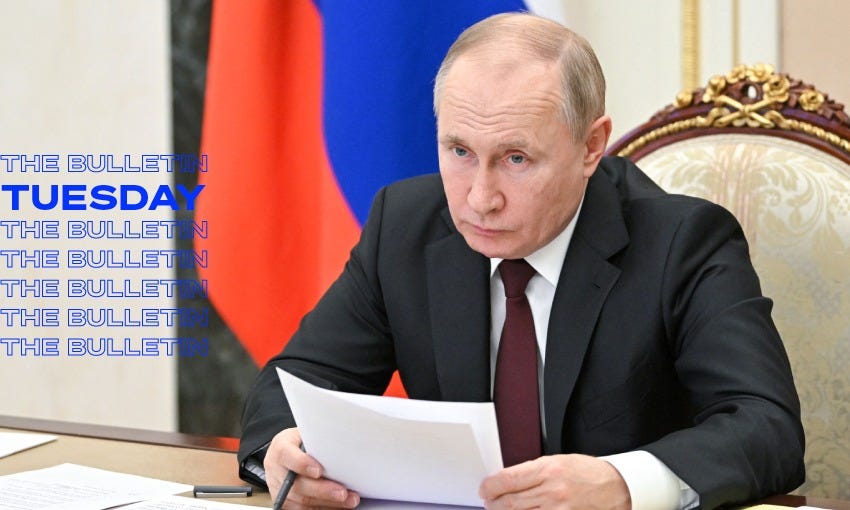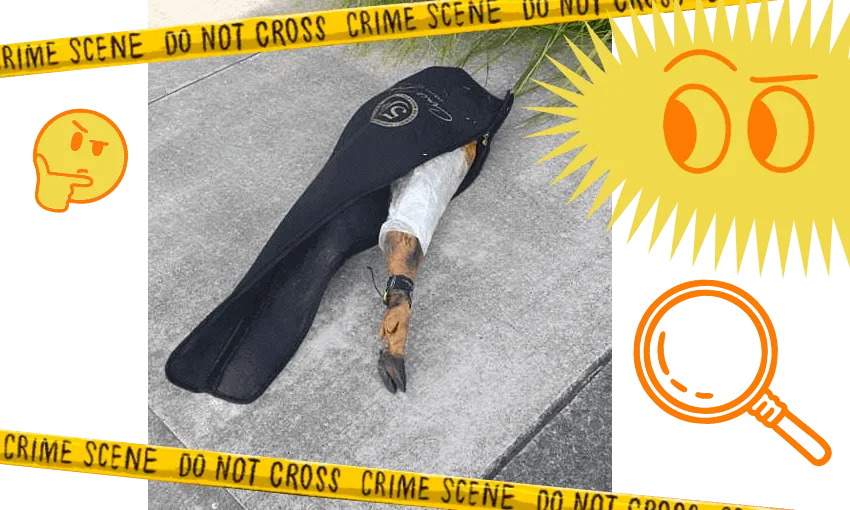New sanctions law to target Russia
The regime in Moscow and Russia’s oligarchs could now see assets frozen and blocked from New Zealand
Mōrena and welcome to The Bulletin for Tuesday, March 8, by Justin Giovannetti. Presented in partnership with Z Energy.
In today’s edition: Luxon tests positive for Covid; a critical view of National’s tax plan; and it’s international women’s day; but first, sanctions on Russia.
Russia's President Vladimir Putin chairs a meeting on economic issues in Moscow on February 17, 2022. (Image: Alexey Nikolsky/Sputnik/AFP via Getty Images)
A new law will speed through parliament this week to sanction Russia.
Twelve days after Russia’s invasion of Ukraine, prime minister Jacinda Ardern has unveiled legislation to create a bespoke sanctions mechanism aimed at Vladimir Putin and his regime. It’s a historic break for New Zealand and a sign of fracturing in the multilateral system the country has long relied on. Until now, Aotearoa’s diplomats had depended on the United Nations to create sanctions at the global level. As RNZ reports, the new Russia Sanctions Bill will apply to the Russian state, along with any of its allies. With the bill expected to clear parliament under urgency tomorrow, it will extend to Russian oligarchs who have supported the invasion. Under the sanctions, certain Russian-owned superyachts, ships and aircraft will be barred from entering New Zealand.
The sanctions will only grow with time as more Russians are added.
The first tranche of sanctions will be relatively straightforward and could be in place by next week. They will include banking restrictions which will close New Zealand to much Russian money, as well as an extended travel ban list. The ministry of foreign affairs unveiled the first 100 names of Russians banned from New Zealand, with Vladimir Vladimirovich Putin at the top of the list. A second tranche will be more complicated and could include the assets of some oligarchs with investments in New Zealand. The prime minister didn’t want to name any by name, certainly not the richest Russian investor in the country, who alone might have $50 million worth of assets here. Stuff wrote about the intense spotlight on billionaire Alexander Abramov last week.
New Zealand’s sanctions follow similar moves by most of our traditional allies.
“Despite international condemnation, and the resilience and resistance of the Ukrainian people, Russia's assault continues and so must our pressure,” Ardern said at a press conference yesterday. As Stuff reports, a more permanent sanctions law will be coming soon. The prime minister criticised the previous National government for flagging the lack of a local sanctions mechanism in 2012 and only writing a bill to deal with the problem five years later in 2017. To be fair, it was a bill her government then refused to pass over the following five years. Cabinet will now be looking at a possible autonomous sanctions bill in the coming weeks that could be used in similar future occasions. Ardern confirmed that Ukraine has requested military hardware from New Zealand, but said the defence force doesn’t hold enough supply to be helpful. Instead, the government pledged $2 million in humanitarian assistance.
You might be wondering if sanctions will do enough.
By itself, New Zealand’s moves yesterday would have little impact. But it’s part of a massive and coordinated global response over the past two weeks. The combined effect has been enormous. The head of Russia’s central bank worse funereal black when she appeared on TV and is mourning her country’s economy, The Guardian reports. The rouble has lost a quarter of its value in days and the Russian economy is now set to enter a severe recession. As for Putin himself, he may have lost something yesterday. He hasn’t been to New Zealand in two decades (we think), but it’s possible Putin was here more than once as a young KGB officer. As Metro reports, there’s good evidence Putin worked out at a judo academy on Cuba Street and travelled the country during two visits under fake papers. It’s a wild story.
A note from Toby Manhire, editor at large
On Wednesday March 2, the 23-day occupation of parliament came to an end amid terrible and unprecedented scenes on the doorstep of New Zealand’s house of representatives. It was a lot to keep up with – and a lot to get our collective heads around. At the Spinoff we were able to call on Justin Giovannetti, our political editor, to report from the press gallery, while Stewart Sowman Lund travelled to Wellington to run our news updates on location.
More than any protest action in New Zealand history, it needed to be understood not just on the ground, but in the digital undergrowth. Dylan Reeve dived into a teachable moment; I surveyed the key figureheads; Madeleine Chapman raised the alarm on a puff piece. Annabelle Lee-Mather, Justin and I discussed it all on the latest edition of the Gone By Lunchtime podcast (listen here).
The story is far from over, and we’ll continue to pull on the threads: from the global context and conspiracy theories to misinformation, disinformation and social media’s role; from the arguments around mandates to social cohesion.
As we continue to struggle against commercial headwinds, contributions from our members are more critical than ever – we simply couldn’t do this work without their support. If you value what we do, please consider becoming a member today. Donate now.
Christopher Luxon tests positive for Covid as omicron spreads.
The National leader tested positive along with a number of his MPs yesterday. The omicron wave is now in parliament, the NZ Herald reports. Simon Bridges, Mark Mitchell, Joseph Mooney, Penny Simmonds and Stuart Smith also tested positive, while Labour ministers David Parker and Poto Williams were cases last week. With the government now focusing on hospitalisation numbers instead of new cases, the prime minister warned the country’s hospitals are entering a critical period. With nearly 700 cases in hospital, there are now critical staff shortages at health care facilities in Auckland, according to One News.
Limp and boring with a $2 billion hole: National’s tax plan.
The National leader’s big tax promise has been met by skepticism and questions. Claire Trevett called Christopher Luxon’s tax plan “a bit boring” in the NZ Herald (paywalled). It wasn’t the speech Luxon wanted to give she reveals, but he responded to omicron and the soaring cost of living by pivoting to tax cuts. The critique from Interest was harsher. It writes that with a war in Europe, flames outside parliament and disturbances around the world, a serious conservative leader would have spoken about security, not tax cuts. Making matters worse, Bernard Hickey crunched the plan’s numbers for the Kaka (subscription). He found that at best, Luxon’s plan is $2 billion more expensive than projected. Depending on how far along the income insurance programme and light rail build would be if National won, it could be over $10 billion off. One correction on yesterday’s newsletter: Luxon wants to keep the 39% tax rate, at least initially, for the richest New Zealanders. Sorry for the error.
More than 28 cases now linked to Wellington protest.
There were fears the 23-day occupation of the parliament grounds could be a superspreader event, but so far only 28 cases have been linked. As RNZ reports, those are cases that are believed to have been protesters, because interviews have largely stopped under phase three. In Auckland, protesters got into an altercation with a local iwi that asked them to move over the weekend. The NZ Herald has footage of the protesters disparaging the iwi and laughing at a haka after a standoff. One of the many distressing parts of the Wellington occupation was when protesters claimed the authority of iwi to bully people off the parliament grounds, only to repeatedly ignore requests from iwi for the protesters to leave.
International women's day: Five New Zealanders to celebrate.
The NZ Herald has profiled five women who we should acknowledge from over the past year. Dame Lisa Carrington became the country’s most decorated Olympian; teenager Jemima Gazley showed incredible bravery raising money for brain cancer before dying from it; Siouxsie Wiles’s Covid advice was seen by millions of households; Kiritapu Allan’s battle with cancer convinced many women to get health checks; and Spark’s Jolie Hodson is a business powerhouse.
A proposal to rebuild New Zealand’s rail network for the 21st century
This country used to have a world-leading rail network that connected every town and city with reliable, efficient passenger trains. Almost none of that network remains outside of Auckland and Wellington. One News look at the challenge of rebuilding the rail system at a time when many other countries are massively investing in their trains. Recent moves by KiwiRail are in the wrong direction. New Zealand has some of the highest per capita road emissions in the world and an efficient train service would be an attractive replacement for many long road trips along winding state highways.
Got some feedback about The Bulletin, or anything in the news? Get in touch with me at thebulletin@thespinoff.co.nz
Alex Casey reports on the mysterious case of the Hobsonville Point ham. Alex Kazemi warns of the challenges facing healthcare after Covid. Tara Ward’s Outlander recaps are back as the show returns from a two year absence. Sela Jane Hopgood writes about TVNZ’s new anthology series Beyond The Veil. Duncan Greive looks at how the protest lost at parliament but won on social media.
How the Black Sox have adapted to Covid curveballs.
New Zealand’s national softball team has adopted the mantra of “control the controllable” after a year where it’s had very little. One News reports on the effort to put together a squad when so many games and trials have been cancelled by Covid. With world championships at the end of the year, many of the country’s best players will soon head to North America for play during the New Zealand winter. It sounds like an absolute nightmare getting enough sluggers and pitchers together to fill the roster, but they’ve powered on. Play ball.













